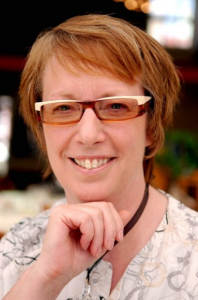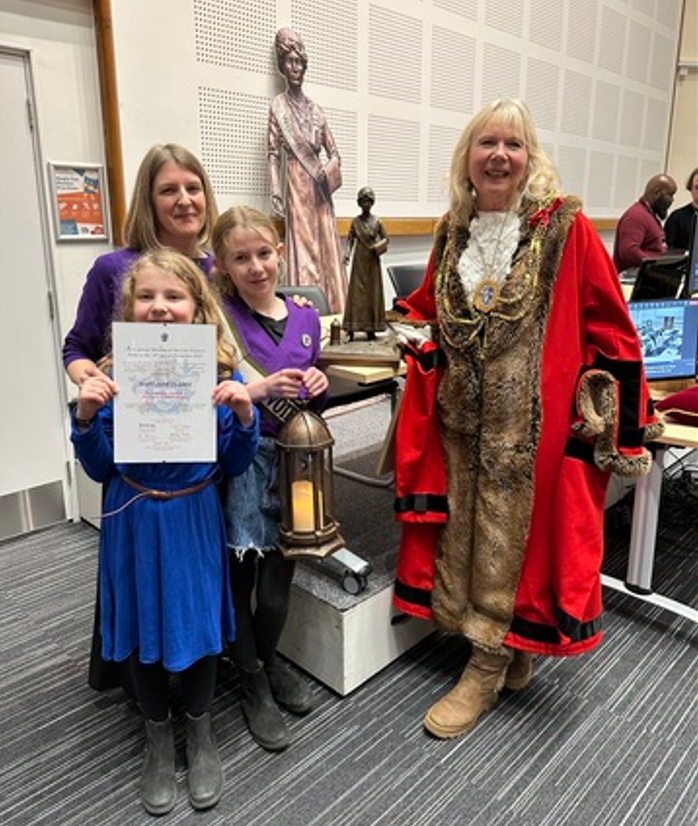The freedom of the city was awarded posthumously last month to Mary Clarke, the first suffragette to die so that women could vote.
The formal decision was taken at a special meeting of Brighton and Hove City Council on Thursday 14 December which I attended as chair of the Mary Clarke Statue Appeal.
The mayor, Jackie O’Quinn, hosted a reception and then presented the certificate to Briony Goulden, who is a great-great-niece of Mary Clarke and an appeal trustee.
She was accompanied by her two daughters, Sylvie and Lena, three times great-nieces of Mary, both child ambassadors of the appeal.
It was a wonderful day on which, as someone said, peace seemed to break out among the politicians and those who made speeches spoke from the heart.
The leader of the council, Bella Sankey, moved the motion in a passionate address. Councillor Mitchie Alexander read a powerful and very moving poem she had written.
Our bronze maquette – or model – made by sculptor Denise Dutton to the design of the eventual statue, was on display on the mayor’s desk, alongside a seven foot “cut-out” to the same design, giving councillors an idea of what the full-sized statue would look like. A hand-embroidered banner depicting Mary Clarke made by the well-known peace activist Jenny Engledow was also on display.
It was a happy event and wonderful to see this previously forgotten woman honoured. Yet I could not help feelings of great sadness, not just at the loss, over centuries, of so many women’s histories, but because so many female lives, like Mary’s, have been snuffed out by violence.
It is a cruel injustice that so many women’s achievements remain obscured – though an increasing number of historians and local organisations now exist to try to put that right.
However, it is an even greater injustice and an ongoing tragedy that, even today, the lives of women recently lost to violence are barely commemorated, certainly not celebrated.
Instead, they are shrouded in shameful oblivion, as if they and not their killers are dishonoured by their deaths.
Many men have been awarded freedom of the city but Mary Clarke is currently the only woman who holds that honour. Unsurprisingly, some at the council meeting expressed the hope that more women would be recognised.
I heard someone mention MP Caroline Lucas as a possible choice. Another suggested Professor Kathleen Stock. Both would be very worthy recipients but that evening I had another woman’s name foremost in my mind. One who, like Mary, died by violence.
Two days before the special council meeting, I had joined members of the Women’s History Group for their Christmas dinner.
It was a significant and a poignant choice, first because it took place on Tuesday 12 December, the anniversary of Mary Clarke’s birth in 1861 and secondly because we met at Donatello’s restaurant in Brighton Place.
Donatello’s was central to the phenomenally successful restaurant business of businesswoman and philanthropist Sue Addis until her untimely and tragic death three years ago.
Over the years, there have been many women deserving of the freedom of the city but none more so than Sue Addis who could and should have received it years ago, while she still lived.
Sue was a woman of extraordinary charm and ability, an inspired businesswoman and one who put her wealth at the service of her community. She was a generous donor to charity and a good friend to many.

I knew Sue only a little, really only to smile at, though I regularly saw her at Donatello’s front of house, supporting staff, making customers feel welcome and of course building her business.
She was a superb communicator and I was in awe at her capacity to network. Sue knew everybody, from local homeless people to the most powerful in the land, who during political conferences made regular visits to enjoy Donatello’s cheerful ambience and simple, tasty Italian food.
When she lived, Sue was probably the most influential woman in the city, which makes it all the more tragic that since her death, people barely speak of her.
Powerful as she was, Sue died like so many women, a victim of domestic violence, brutally stabbed by her grandson in the most painful and undignified of circumstances.
The British are notorious for their inability to talk about death or the dead – even to use the words. However, this conspiracy of silence is worsened when the victim dies by violence or by their own hand and is worst of all when the victim is a woman, especially one killed by a member of her own family.
When this is the case, however talented the woman, however great her contribution to her community, more will be written about the perpetrator than about the victim. And when the publicity about the crime dies down, there is silence. Just silence.
People drop their voices when Sue Addis is mentioned but mostly she is not mentioned at all. This vibrant woman who lived so well has been cut down twice – once by her grandson and then by us, her community. It is thus that women are forgotten.
Sue’s grieving family have quietly set up a memorial fund in her name and this is to be welcomed but it is not enough. Sue’s community needs to do more, much more.

The council might name a park or city centre building or square after her – or rename Brighton Place, the street Donatello’s has dominated for so long, as Sue Addis Street. It should not be possible to so easily snuff out a woman’s legacy.
As a start, the council could award Sue the freedom of the city she served for so long. But before that, it needs to do something more fundamental, which is to simply talk about her, not just about her terrible death, though that must be remembered, but more importantly about Sue herself, her smile and her laughter, and the courageous and generous way she lived her life.
The campaign for a statue for Mary Clarke has never just been about commemorating one exceptionally brave, historically important woman whose story was lost.
It also sets a path towards reclaiming the histories of other women subject to violence, honouring their lives and wrenching their names out of shame and silence.
Mary Clarke was forgotten for too long. We need to make certain this does not happen to Sue Addis. We need to speak her name.
Jean Calder is a campaigner and journalist. For more of her work, click here.










Please recognise this lively lady in Brighton. Hopefully this will encourage more woman to do something about looking after other people, with empathy, encouraging others to shine a light.
Thank you Jean, for this very moving piece on the celebration of women including the loss of Sue Addis and the need for an acknowledgment of the true public-spiritedness that Sue spent her career championing. She truly was a one-off and so many people benefitted from her charitableness and her friends and family hope to bring about something that will honour her memory in an appropriate way. It would be great to, at the very least, honour Sue with the freedom of the city – she deserved it in life so certainly deserves it posthumously.
An inspiring piece of writing and you ar eof course correct. People should be recognised not just for their contribution to the City but equally because they are goo dpeople . The problem is that B7H have had many many good people live there BH&D Bus compnay have recognised many with their bus naming scheme which is fantastic
Charlotte Eades for instance what a brave young lady !!!!! Streets and other sturctures should be so named but may be they need to be appropriate. Why not a walk of fame along Western Road and you can start with Sue and Charlotte Thank you
My thanks to you Jean for your wonderful shoutout piece of writing regarding remembering Sue Addis. She was indeed a fabulous representation of a woman who gave so much support to others in our community of B&H.
Never shy on coming forward for a good cause or just a listening ear, she truly was an exceptional female. Let us all keep her name in ‘ now time ‘ for a suitable recognition.
The fact that Jean thinks that Kathleen Stock, someone who sowed seeds of transphobia in our community, is worthy of being given the Freedom of the City speaks volumes – shame on B&H News for continuing to give Jean a platform for her dogwhistling transphobic bile
Not at all. Ms Stock just entered into debate how allowing trans women into ladies loos and other single sex places was not on. Then the pitchfork brigade got involved with threats of violence and total hatred/fury. Her employers and union did not support her, much to their shame.
No doubt this comment will attract all manner of bile and vehemence, but I am in the majority belief that she had a point. Much as you may not like it.
Grow up.
Blimey!, “concerned reader”, your comment is beyond shame itself
Sue Addis was a kind, tenacious and charitable lady, who went above and beyond, in whatever she did, whether for her family, in business, in charity or personal acts of kindness. As well as my family being regular visitors, to both Pinocchio and Donatello, where we’ve shared hundreds of lovely meals and celebrations, we experienced first hand, the extraordinary kindness of Sue Addis. On Christmas Eve, December 2020, while my late sister was undergoing brutal treatment for terminal cancer, Sue Addis, on hearing that my sister was craving Donatello Minestrone Soup, drove out of her way at 8.30pm to Portslade, to bring a bag full of soup portions. We were brought to tears, by her comforting words, kind gesture and lovely smile. This was Christmas Eve 2020. On 7th January 2021, Sue was Dead. We were so upset and shocked, that someone so selfless and thoughtful to others, had met such a terrible end. We shall always remember this wonderful lady x
I am very moved at the reading of this text, because Sue Addis was not only a wonderful and brave woman, but most of all she was my aunt. Not a day without thinking of her and still not realizing she is gone, and we – her family- just can’t accept the injustice of her death.
She was one of a kind, such a funny, smart, wonderful and discrete woman, and I am just proud of her, and I really hope her name will never be forgotten.
I love you Auntie.
Caterina